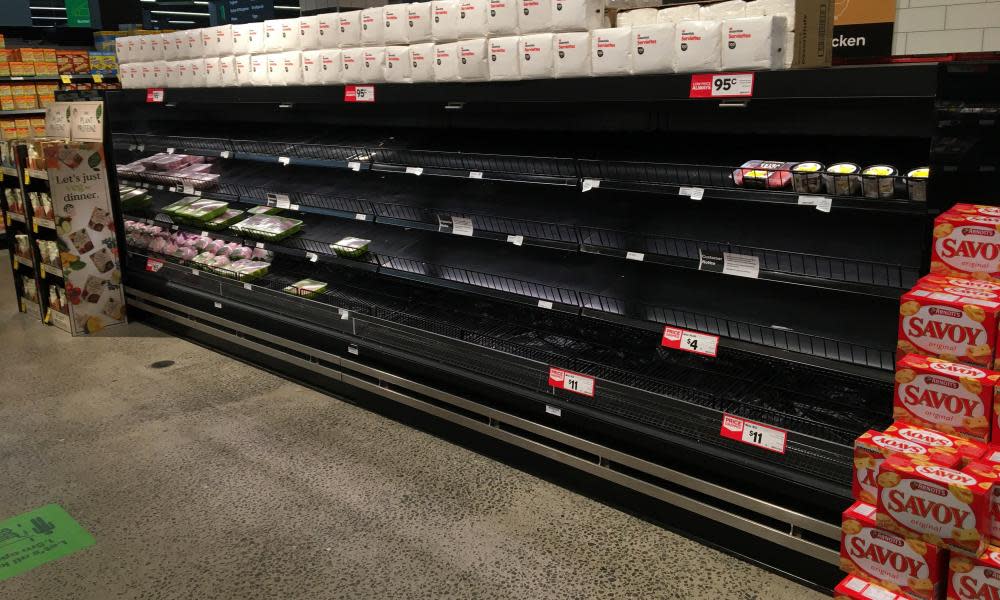Victorian lockdown may lead to supermarket supply issues – but panic buying impact greater

Experts have said Victoria’s restrictions on warehouses could lead to supply issues for the state’s supermarkets – but shelf shortages can be avoided if people do not panic-buy.
From midnight on Sunday, the workforce of supermarket warehouses and food distribution centres will be reduced by one third, under Melbourne’s stricter stage four lockdown.
Staff levels in large abattoirs and red meat processing plants will also be reduced by a third, and reduced in poultry processing plants to 80% of normal capacity.
Related: 'Very dead': army and police patrol the deserted streets of coronavirus-stricken Melbourne
Supply chain experts from Victorian universities told Guardian Australia this would likely have some effect on supermarket supply, availability and variety – but that shelf shortages could be prevented by consumers moderating their demand.
Dr William Ho, an associate professor of operations management at the University of Melbourne said the changes would “absolutely” impact supermarket supply.
“Because the workforce capacity is reduced, that would affect the replenishment time,” he said. “Delivery, stock preparing, this kind of time will be lengthened. But I am still optimistic there will not be any long-term shortage of food.
“On one hand the lead time of production and delivery will be longer, and that will affect the replenishment time. However, I do not believe that will be a sustained shortage of food in Australia and Victoria.”
Dr Amrik Sohal, a professor in the department of management from Monash University, said that consumers “should not panic” and that demand could drop in Melbourne due to its curfew and product limits in stores.
The chief executive of Master Grocers Australia, Jos De Bruin, told the ABC earlier this week that the changes would have “an immediate impact on our shelves” and “slows things down”.
Ho agreed, but said that changes introduced on Thursday had improved the situation.
“Luckily on Thursday, because of the intervention by the government, which reduced the percentage for poultry and gave some exemptions to some smaller sized abattoirs, this has minimised the negative impact on the food supply chain in Victoria and the national supply chain.
“I welcome these compromises, while I fully understand the starting point of posing these restrictions. Especially in abattoirs, where the working conditions would very likely transmit the virus due to the low temperatures and close contact with other workers and the dry air.”
Sohal said shelf shortages were caused by panic-buying and spikes in demand rather than shortages in supply.
“It’s really people panicking and buying much more than they need,” he said.
“Because of the reduction in capacity at the supplier end, reduced volumes are produced because of that reduced capacity and a reduction in variety perhaps, and some delays in delivery may result in shortages as well.
“There may be [shelf shortages] but given the restrictions and the lockdown, fewer people are going to the supermarket. Currently only one person from each household is allowed to go to the supermarket, if they are not in a panic-mode and buying a lot … given the reduced traffic into the supermarket this may not lead to shortages.
“I feel that, to some degree, demand is reduced as well. We are not having friends over, having parties, excessive eating. I feel, especially in my household, we are consuming less.”
Woolworths’s managing director, Claire Peters, said it would comply with the restrictions “while also preserving the supply chain capacity our customers rely on”.
The retailer recently lifted restrictions on some products – not including toilet paper, meat and other fresh foods – due to dropping demand.
“Following consultation with the Victorian government, we’ll reduce the movement of workers across our broader Victorian supermarkets operation to meet the targets,” Peters said. “This will allow us to continue running our Melbourne distribution centres at the necessary capacity as we deliver reductions in movements in other parts of our business.”
Related: Is Melbourne's coronavirus curfew likely to be effective? We ask the experts
Sohal said that “if the supermarkets put the right measures in place, they should be OK”.
“I think consumers should not panic,” he said.
Ho also said that he wanted to see improvements in safety and personal protective equipment in abattoirs to ensure the safety of workers in the supply chain.
“I would like to see some more measures to preserve the hygiene, we need to provide enough PPE and protective coats,” he said. “Can we have a facility better laid out, or a partition to avoid too-close contact between different workers?”

 Yahoo News
Yahoo News 
